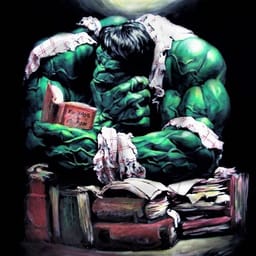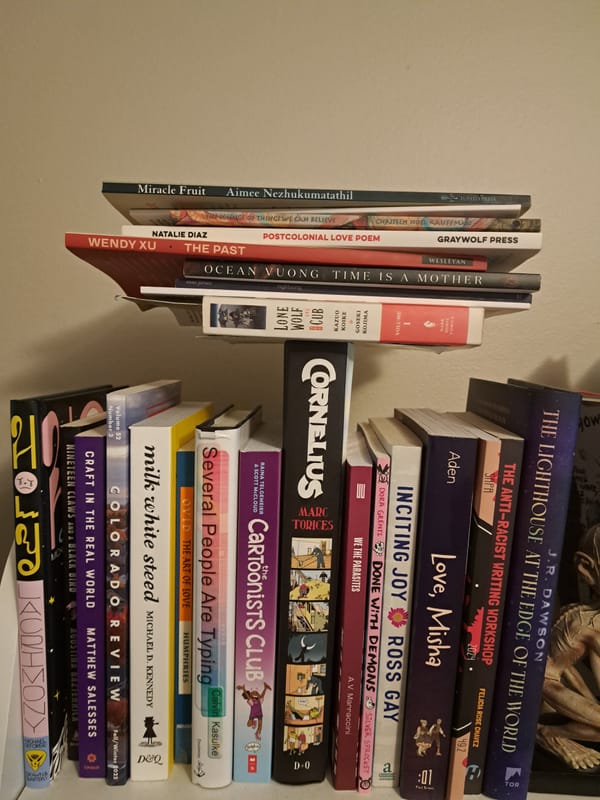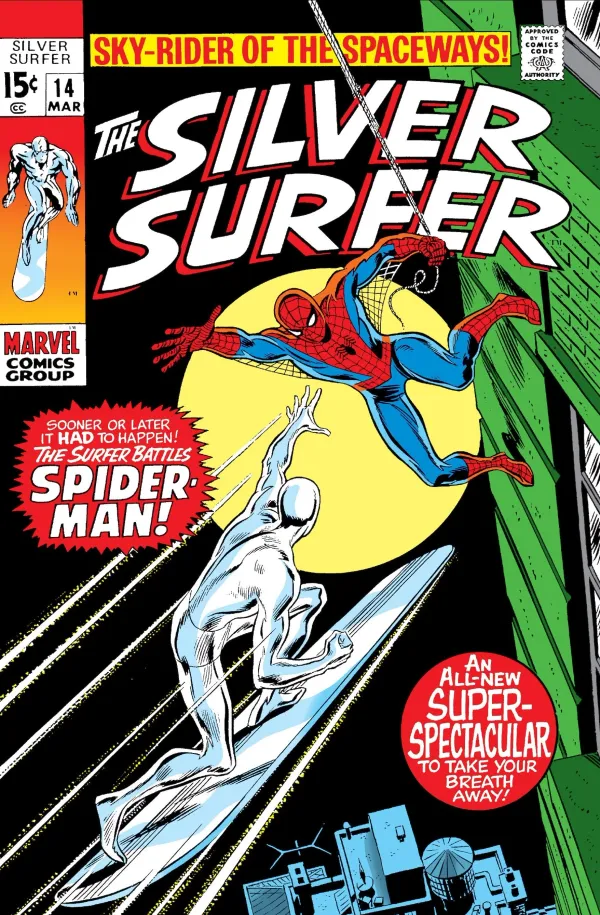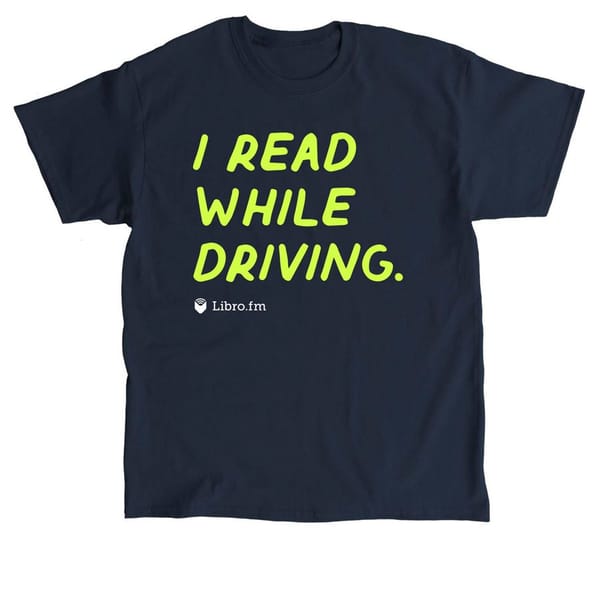Twenty Thoughts on On Tyranny: Graphic Edition
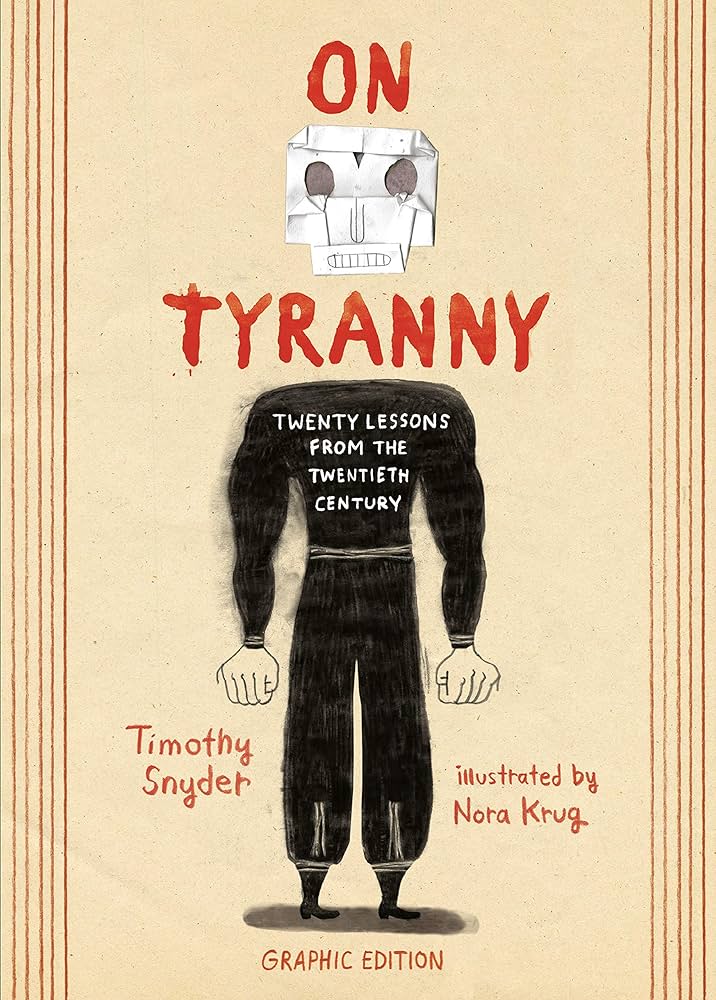
1.
Like many people I’m reading On Tyranny by Timothy Snyder to get a better idea of what a more tyrannical, authoritarian government looks like and what I can do right now. Like some people I read the graphic novel version which has illustrations by Nora Krug. Like other people, I have thoughts and really found much of this book enlightening, challenging, fascinating, and other words that end with -ing.
I’ve collected those thoughts here in twenty sections. I asked my child to draw something for each and they responded, “No thanks.” This felt like my first experience with someone living the lessons in Snyder’s book.
So, here we go.
2.
A lot of people have been rightfully quoting the first lesson that Snyder presents about not complying in advance. I like that one a lot. It’s one we should remind ourselves of constantly. It’s been helpful to have the whole thing in my head but this specific refrain of not complying with evil has been a steady, good, and welcome reminder.
3.
But the most striking lesson that I found in the book was number 7: Be reflective if you must be armed.
This is something that always stands out to me in conversations around police violence, military occupation, revolt, or fascism; these are people who carry out these acts of terror. The people who carry out these acts are often not the ones benefiting the most from the terror. Are the police officers really benefiting from holding hands and protecting an Amazon truck? More than Amazon? I assume not.
Yet, there are people who are going to be asked to murder, maim, kidnap, terrorize, beat, and torture others who want to resist. They’ve already been asked to do so. And this lesson calls out to them specifically saying that there is always the option to say, “No.”
I’m drawn to this because I’m also drawn to the ways in which the people who are armed are portrayed or discussed. They’re heroes until they reflect on the things they do and ask for change. They’re soldiers and we love them until they retire or are in need. The image we paint of them in popular media is complicated and often, I feel, unfair to their souls. Media wants the rest of us to think that taking someone’s life, no matter how justified, is something that you can move on from or get used to. Honestly, I don’t think actually taking someone’s life, like really physically being there and using your own two hands to do it, is something you come back from.
It felt like something to remind the ones in your life who serve in the military or in any armed position: you can say no.
4.
My grandfather fought in World War II on the Japanese front. He was proud of his service but not of the fact that he almost got himself killed a couple times. Or, maybe, he was proud of that in the way that we’re proud to say we survived.
He once sat me down at his kitchen table, which sat up against a wall with a window facing his backyard. I would chew on the green onion that grew wild on the fence there with my grandmother. The window had stained glass that made the table colorful but seemed to keep out most of the heat. And that table smelled of the way my grandparents smelled; like earth and oil and sweat and discount anti-perspirant. I hated it when I was a kid, but cried last year when a woman walked by me smelling the way my grandparents did.
My grandfather always sat on the left if you were facing the window. It was just him and I at the table. He drank a diet cola, ate something I can’t remember clearly, and dropped a little bit of it on his white t-shirt with the holes in the collar. I must have asked him about the war, or he was feeling in a sharing mood, so he told me about the one man he knew he killed. He was sure he had killed others but from a distance. He shot a lot into places that bullets where coming from, not often seeing other people. This was the one man he watched die.
When he talked about it, there wasn’t any sound from outside. I couldn’t smell anything but the heaviness of his breath. There wasn’t any colorful light. He remembered his name and his face. He remembered going through his wallet. He remembered seeing a picture of this man’s wife and children. He shook as he told me.
My grandfather’s memory wasn’t filled with regret. It was filled with what stayed with him about this other human that he met then killed. There was something that he lost that day that never returned. I saw the absence in his body. I saw that he lacked something. I’ve never wanted to have that weight on my conscious.
5.
My father told me once he stopped hunting because he almost shot my uncle, his brother, out of anger.
My father applied to be a police officer when younger. They told him, in training, that he shot too quickly, that he didn’t take time to think about what he was doing.
He died at home, alone.
I wish I could ask him more about this now.
6.
I’ve decided to take lesson 10 to heart more: believe in truth.
I like this lesson and feel it’s important to impart to my students, which seems obvious, but I also feel more inclined to refuse to let things go when others say things that are partly, or completely, untrue.
Just got off the phone with my mother and tried it out. It wasn’t the best. I’ll get better at it, I hope.
Honestly, I think this will make me less fun to be around. I fear that I’ll be more annoying than I already can be. And I can be annoying. I talk a lot. I get nervous. I get excited easily. Some people have told me it’s more endearing than anything.
I don’t think focusing on the truth will make me more endearing.
7.
Of course I loved the ninth lesson: be kind to our language. Specifically, the part where it says read books. I love reading books.
8.
I wonder if Snyder meant read as in closely or read as in consume? I assume the first. But I wonder, still, if reading closely is what he has in mind. If so, why doesn’t he seem to read history very closely?
9.
Make eye contact and small talk? Yes please. But also, please don’t make me.
I love talking small. It’s wonderful. I’ll bullshit until the end of the day. Just try to get me to leave a party. I’m often the last one there. I’m often asked to leave because I’m having too much fun gabbing.
But eye contact seems like a lot. Can I just gab while looking everywhere but the person’s eyes? That’d be nice.
10.
Many of these lessons don’t seem to apply to me or are things that I have incredibly limited power over. I liked that. I liked thinking that I was a small part of a greater whole that could shift things towards what is good and what is best for those who are targeted by authoritarian policies.
I really liked feeling like I had power but that there are others also with power.
11.
I finished a book recently, Becoming Abolitionists by Dereka Purnell. It’s very good. Especially if you aren’t familiar with the idea of abolition or are playing with the idea itself, Purnell’s book is an amazing beginning. I wish it was my beginning.
I’m growing more and more abolitionist as my life continues. I find less and less reason for things like prisons or police, especially if we, like Purnell suggests, think about tackling the root problems first instead of thinking of only the reaction to a problem once it arises. I’m surprised by this growth towards abolition and then, also, not. I imagine many are in this space where they want to believe that there are people out there protecting us, but also see the evidence that it isn’t true over and over again.
My point here is that I thought a lot about On Tyranny while finishing Becoming Abolitionists. There was a conversation there. One that Snyder seems to want to ignore, especially because it complicates a lot of his ideas.
12.
Do we want to protect institutions that hurt immigrants, children, the disabled?
How do we see the difference between a party that wants to enslave a group of people by putting them in prisons versus a party that wants to kill you slowly with disease, poverty, and other forms of torture? Is it possible that for some, two parties can be one especially when one agrees with the other and both want to send you to another country’s prison?
Would it be professional to follow the rules of a faculty senate when that school is prosecuting its own students because they don’t want others to be murdered? Was it professional when Jesus flipped over the tables at the temple? Did the business people leave saying, “He could have asked us nicely”?
What if our investigations turn up things that means Snyder would have to give something up? Would he give it up? Would he do it for the benefit of fighting fascism?
What is a patriot? Is it a dangerous word? Is it being kind to our language to talk about patriotism? Does it contribute to good causes? Which ones? Where? How courageous must I be to accept the contradictions?
13.
I’m often full of questions. But I like that more than having answers.
I believe things, sure. And I support different ideas and people and places. I do my best to balance what I know with what I don’t and make decisions based in that.
But I’m full of questions. So what I don’t know I like to learn. I like to reach out and seek for new things and understanding. I’m white and cis and straight and male and from the Midwest and mostly able bodied and fat (nonderogatory). This, along with so many other intersections, provide a narrow view of how things work or could work. Hence, I like to reach out and find what others think who are not me.
So I have to wonder, after seeking out for so long, who is Snyder’s lessons for? Is it white people who are now, suddenly, potentially victims in the making? More importantly I think of this question: what happens if people who look like me keep asking questions? What if they find out about planted evidence on brown and black bodies? What if they find out about our language being used against some but not others? What if? What if? What if?
See? I just keep asking questions.
14.
At one university I taught at, during the height of the Black Lives Matter movement, the black student union on campus wrote a document asking the university for a set of changes to make non-white students feel more welcome and at home. My department met to talk about these and to see which ones we could implement.
To be fair, many were things the department could fix but the university board/senate would have to take up for it to actually stick. As an English department, we used words to support these. I was happy about this.
But, to be fairer, there were two simple things that our department could start doing immediately, that was within our control: use diversity, equity, and inclusion as a part of the promotion process for tenure faculty (meaning making it a central tenant of what they did to be promoted rather than an add on that made them seem more “attractive”) and to actively promote more readings/materials that were more inclusive of different identities other than white.
We could of done these immediately. Hell, we could have said that we did them immediately then not really done them. The black student union just wanted them written somewhere that we were trying. They wanted language. We could have gotten away with being performative.
We did neither.
Some of us asked why and we were told that it was impossible. They couldn’t do it. But they could. They just didn’t.
Which of Snyder’s lessons is that?
15.
I think that many people are smarter than me when it comes to thinking about resistance. I don’t really know what to tell people to do nor do I think I have the authority to do so. I think this is why I really enjoyed Snyder’s book so much. It gave me things to do. It feels authoritative.
I think about what it would take for more people to look into the world and see things wrong and try to correct them. I think that this is an excellent step. I think we can keep doing better, that there is no end goal except more kindness, more good, more life for our children’s children to live and love around.
16.
Once a student told me that they wished I gave late penalties for their essays so that they would feel more motivated to turn them in. I asked them if me asking them to do their best, even if it took an extra two days, wasn’t enough.
They told me they’d never considered that I wanted them to do their best, they assumed I just wanted the paper turned in.
This was a lesson for me. Was it a lesson on tyranny?
17.
I struggled with Nora Krug’s illustrations and art throughout. Mainly because I read the book for a comic book book club and it didn’t feel like “comics”. I’m not sure what I mean by that.
But, the design of the book really is what made me love it more. It felt like Krug thought about how to deliver these ideas inside of images and around them and between them. How to incorporate things from the world as it is now and from the world inside of her mind.
In the end, the book felt more personal with Krug’s work. I think that I would have felt more disconnected or frustrated by the book if it were in paragraphs alone.
I think I’ll take some time and read the text version I have on my shelf. See if there’s a difference.
18.
I’m thinking about how Snyder is moving to a university in Canada to teach this year. This feels frustrating to me because it is a move that only someone with relative wealth and an uncomplicated personal life can make. Or maybe “less complicated” is what I mean?
I’m concerned it’s jealousy. How I would love to pick up and move and not worry about something terrible going on. Then I take a moment to think about that and go, yea that’s the privilege talking there. If I could use that privilege, would I? And would that be courageous?
I think that it frustrates me because it always feels like there’s someone wealthy and white that reaches out to say something beautiful and true, then they just leave. And this frustrates me because I don’t want to know about the ones who walk away from it all. I want to know about the ones who stay and fight.
More precisely, I wish more stood and fought. I can find the ones fighting but when someone leaves it means the rest of us have to fight harder. And that really pisses me off.
19.
I love the lessons that books teach us. About ourselves. About each other. About the world.
I love that sometimes those lessons are in lists and then the lists become essays that become books that become topics that become people’s whole identities and my god how I love the way that reading expands us.
I love expanding, becoming more. To understand more. To love more. I love the more love that reading can give us.
I also love disconnection. The ways that things don’t always fit neatly. The mess. I love a good mess. It’s the only way I end up loving myself.
20.
I want my child to look back and tell me I was kind, good. I want them to then tell me how I could do better.
I want to reflect and then change. Even when I’m old as hell. Even when I have only a few weeks left. I want to do better, be better. Don’t you?
If you like my writing, please subscribe for free to get monthly updates! Or help me keep the lights on to read the books by tipping below.


